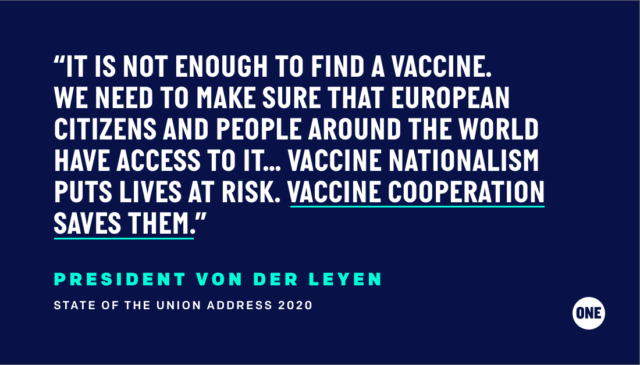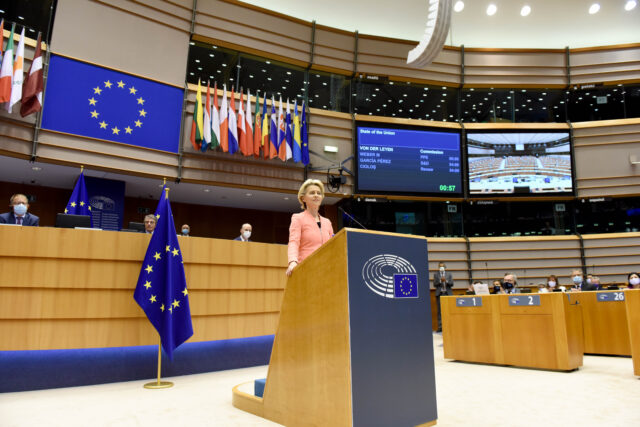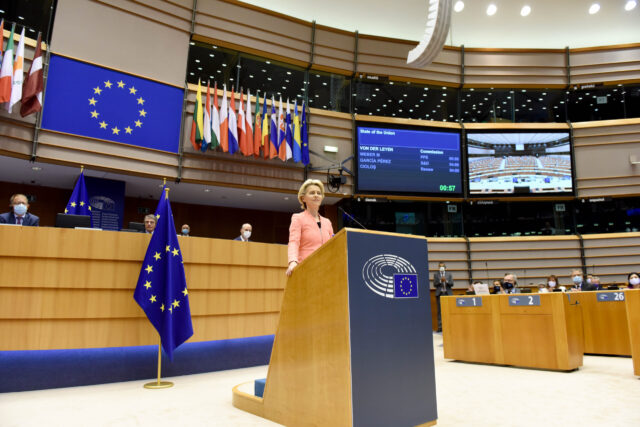In her first annual address to the European Parliament, President Ursula von der Leyen accomplished something few of her [all male] predecessors have managed to achieve: she was crystal clear. No lofty rhetoric. No mild-mannered circles around delicate topics.
On a list of issues ranging from the COVID-19 pandemic response, to dealing with China, to fighting racism in Europe, President von der Leyen sent a strong, blunt and consistent message – the global system is breaking down, and we are not going to fix it by cautiously sidestepping controversy and only looking out for ourselves. Solidarity, multilateralism, and cooperation are not just good principles; they are the only strategy where everyone wins.
Vaccine cooperation, not nationalism
Take COVID-19 vaccines as an example. President von der Leyen issued a sharp critique of richer countries that have been purchasing most of the future vaccine supply for their own citizens. This approach not only puts lives at risk because citizens in low-income countries could be left without a vaccine for years, it could also prolong the pandemic by continuing the spread of the virus.

President von der Leyen was spot on when she declared “vaccine nationalism costs lives,” but it is worth noting that this is an area where the EU still has room for improvement. Despite a recent contribution to the global COVAX Facility, the EU’s vaccine deals have not been very transparent or aligned with the WHO’s vaccine allocation guidelines. The EU has yet to leverage its political weight and financial investments to encourage the expansion of access to licenses and intellectual property, or sign up to the WHO’s Solidarity Call to Action.
Unless all leaders take ambitious steps to ensure COVID-19 vaccines and treatments are available to everyone who needs them, we will all be at risk. A short-sighted, business-as-usual approach isn’t enough to stop this pandemic. We need leaders to step up with ambitious commitments to ensure vaccines are produced as widely and inexpensively as possible.
Fighting for equality, everywhere
In the same vein, President von der Leyen also sent a stern reminder that in an interconnected world, our health is not the only thing dependent on our neighbour. Whether in our backyard or on the other side of the world, racism, inequality, and attacks to democratic values such as freedom of speech are a threat to everyone. All abuses are unacceptable she declared – from LGBTI-free zones in Europe to abuses against Hong Kong and the Uyghurs, to election tampering in Belarus.
However, similar to her statements on vaccines, President von der Leyen’s track-record hasn’t yet caught up to her sparkling statements. The EU has a notorious reputation for sweeping political landmines under the rug at home, and aside from withholding EU funds to “LGBTQ-free zones” in Poland in July, President von der Leyen has remained mostly silent on other serious situations in Poland, Hungary, and now Bulgaria. While von der Leyen deserves credit for being the first president to provoke a serious conversation about racism across Europe, she also stopped short of discussing racism within the EU institutions.
On issues outside of the EU, strong positions on delicate issues are equally rare, due to the requirement of unanimous consent between all member states on foreign policy decisions. President von der Leyen announced her support for qualified majority voting on foreign policy issues (to a thunderous standing ovation), but this is easier said than done. Former President Jean-Claude Juncker committed to this in his 2018 State of the Union address, and it never got off the ground.

© European Union, 2020, Source: EC – Audiovisual Service
What’s next?
As we have seen in previous State of the Union addresses, making promises is only half the battle. President von der Leyen pledged a staggering list of forthcoming commitments on health and equality, and with such clear and ambitious statements, it is undeniable that she still has some work to do to turn principles into practice.
During her address, President von der Leyen repeated that “none of us are safe until all of us are safe,” and it is reassuring to know she understands what this really means. Ending this pandemic, fixing our broken global system, and defending equality all share something in common. Success is not possible if every country, group, and person only defends their own interests. We have to look out for each other.



